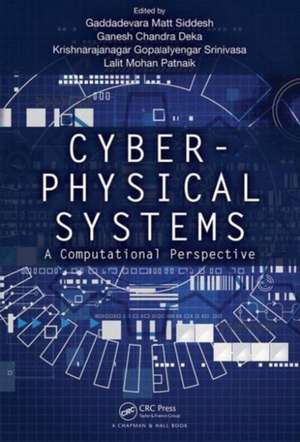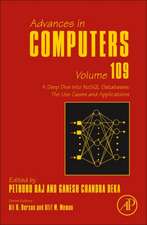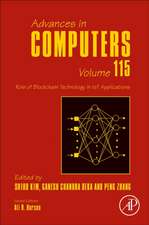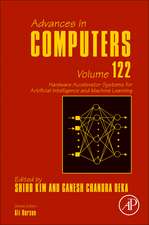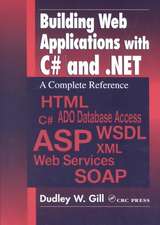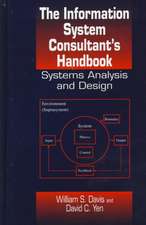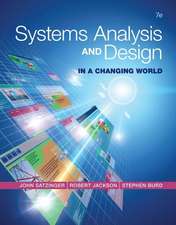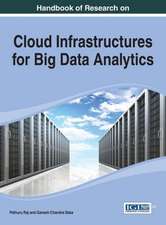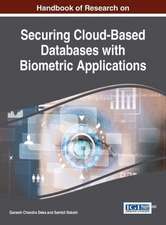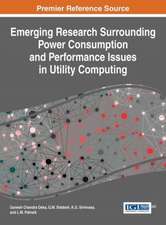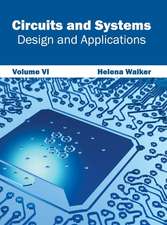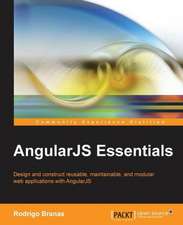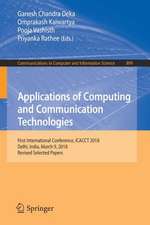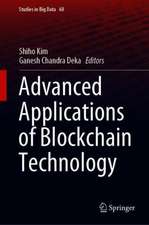Cyber-Physical Systems: A Computational Perspective
Editat de Gaddadevara Matt Siddesh, Ganesh Chandra Deka, Krishnarajanagar GopalaIyengar Srinivasa, Lalit Mohan Patnaiken Limba Engleză Hardback – 18 noi 2015
The book is divided into six sections. The first section covers the physical infrastructure required for CPS, including sensor networks and embedded systems. The second section addresses energy issues in CPS with the use of supercapacitors and reliability assessment. In the third section, the contributors describe the modeling of CPS as a network of robots and explore issues regarding the design of CPS. The fourth section focuses on the impact of ubiquitous computing and cloud computing in CPS and the fifth section discusses security and privacy issues in CPS. The final section covers the role of CPS in big data analytics, social network analysis, and healthcare.
As CPS are becoming more complex, pervasive, personalized, and dependable, they are moving beyond niche laboratories to real-life application areas, such as robotics, smart grids, green computing, and healthcare. This book provides you with a guide to current CPS research and development that will contribute to a "smarter" planet.
Preț: 1131.91 lei
Preț vechi: 1414.89 lei
-20% Nou
Puncte Express: 1698
Preț estimativ în valută:
216.62€ • 225.32$ • 178.83£
216.62€ • 225.32$ • 178.83£
Carte tipărită la comandă
Livrare economică 14-28 aprilie
Preluare comenzi: 021 569.72.76
Specificații
ISBN-13: 9781482259759
ISBN-10: 1482259753
Pagini: 644
Ilustrații: 310
Dimensiuni: 178 x 254 x 38 mm
Greutate: 1.27 kg
Ediția:1
Editura: CRC Press
Colecția Chapman and Hall/CRC
ISBN-10: 1482259753
Pagini: 644
Ilustrații: 310
Dimensiuni: 178 x 254 x 38 mm
Greutate: 1.27 kg
Ediția:1
Editura: CRC Press
Colecția Chapman and Hall/CRC
Public țintă
Professional Practice & DevelopmentCuprins
Physical Infrastructures for Cyber-Physical Systems. Energy and Reliability Issues in Cyber-Physical Systems. Robotics and Smart Systems in Cyber Context. Ubiquitous and Cloud Computing for Monitoring Cyber-Physical Systems. Security Issues in Cyber-Physical Systems. Role of Cyber-Physical Systems in Big Data Analytics, Social Network Analysis, and Healthcare.
Notă biografică
Gaddadevara Matt Siddesh is an associate professor in the Department of Information Science and Engineering at M.S. Ramaiah Institute of Technology. Dr. Siddesh is a member of the Institute of Electrical and Electronics Engineers (IEEE), the Indian Society for Technical Education, and the Institution of Electronics and Telecommunication Engineers (IETE). His research interests include distributed computing, grid/cloud computing, and the Internet of Things. He earned a PhD in computer science and engineering from Jawaharlal Nehru Technological University.
Ganesh Chandra Deka is the principal of the Regional Vocational Training Institute for Women in Tura, under Directorate General of Training, Ministry of Skill Development and Entrepreneurship (formerly DGE&T, Ministry of Labor & Employment), Government of India. He is a member of the IEEE and IETE, an associate member of the Institution of Engineers (India), and the editor-in-chief of the International Journal of Computing, Communications, and Networking. His research interests include information and communications technology (ICT) in rural development, e-governance, cloud computing, data mining, NoSQL databases, and vocational education and training. He has edited three books on cloud computing and published more than 40 research papers. He earned a PhD in computer science from Ballsbridge University.
Krishnarajanagar GopalaIyengar Srinivasa is the principal investigator for many projects funded by UGC, DRDO, and DST. He has been a recipient of several awards, published more than 100 research papers, and authored two books. His research areas include data mining, machine learning, and cloud computing. He earned a PhD in computer science and engineering from Bangalore University.
Lalit Mohan Patnaik is an honorary professor in the Department of Electronic Systems Engineering at the Indian Institute of Science, Bangalore, and an INSA Senior Scientist and adjunct faculty at the National Institute of Advanced Studies, Bangalore. He has published more than 1000 research papers and is a coeditor/coauthor of 21 books. He is a fellow of the IEEE, IETE, the Institution of Engineers (India), The World Academy of Sciences (TWAS), the Computer Society of India, the Indian National Science Academy, the Indian Academy of Sciences, the National Academy of Sciences, and the Indian National Academy of Engineering. He is also a life member of the VLSI Society of India and the Instrument Society of India and a founding member of the Executive Committee of the Association for the Advancement of Fault-Tolerant and Autonomous Systems. During his long career, Dr. Patnaik has received numerous honors, including the IEEE Computer Society’s Meritorious Service Award, the Goyal Prize for Applied Science, and Indian Science Congress Association’s Srinivasa Ramanujan Birth Centenary Award. His research areas include parallel and distributed computing, computer architecture, CAD of VLSI systems, theoretical computer science, real-time systems, soft computing, and computational neuroscience. He earned a PhD in real-time systems from the Indian Institute of Science, Bangalore.
Ganesh Chandra Deka is the principal of the Regional Vocational Training Institute for Women in Tura, under Directorate General of Training, Ministry of Skill Development and Entrepreneurship (formerly DGE&T, Ministry of Labor & Employment), Government of India. He is a member of the IEEE and IETE, an associate member of the Institution of Engineers (India), and the editor-in-chief of the International Journal of Computing, Communications, and Networking. His research interests include information and communications technology (ICT) in rural development, e-governance, cloud computing, data mining, NoSQL databases, and vocational education and training. He has edited three books on cloud computing and published more than 40 research papers. He earned a PhD in computer science from Ballsbridge University.
Krishnarajanagar GopalaIyengar Srinivasa is the principal investigator for many projects funded by UGC, DRDO, and DST. He has been a recipient of several awards, published more than 100 research papers, and authored two books. His research areas include data mining, machine learning, and cloud computing. He earned a PhD in computer science and engineering from Bangalore University.
Lalit Mohan Patnaik is an honorary professor in the Department of Electronic Systems Engineering at the Indian Institute of Science, Bangalore, and an INSA Senior Scientist and adjunct faculty at the National Institute of Advanced Studies, Bangalore. He has published more than 1000 research papers and is a coeditor/coauthor of 21 books. He is a fellow of the IEEE, IETE, the Institution of Engineers (India), The World Academy of Sciences (TWAS), the Computer Society of India, the Indian National Science Academy, the Indian Academy of Sciences, the National Academy of Sciences, and the Indian National Academy of Engineering. He is also a life member of the VLSI Society of India and the Instrument Society of India and a founding member of the Executive Committee of the Association for the Advancement of Fault-Tolerant and Autonomous Systems. During his long career, Dr. Patnaik has received numerous honors, including the IEEE Computer Society’s Meritorious Service Award, the Goyal Prize for Applied Science, and Indian Science Congress Association’s Srinivasa Ramanujan Birth Centenary Award. His research areas include parallel and distributed computing, computer architecture, CAD of VLSI systems, theoretical computer science, real-time systems, soft computing, and computational neuroscience. He earned a PhD in real-time systems from the Indian Institute of Science, Bangalore.
Descriere
This book examines various developments of cyber-physical systems (CPS) that are impacting our daily lives and sets the stage for future directions in this domain. The book covers the physical infrastructure required for CPS, addresses energy issues in CPS with the use of supercapacitors and reliability assessment, describes the modeling of CPS as a network of robots, and explores design-related issues. It also discusses ubiquitous computing and cloud computing, security and privacy issues, and the role of CPS in big data analytics, social network analysis, and healthcare.
